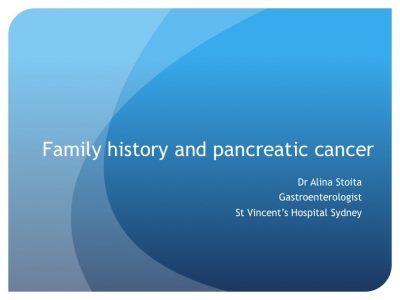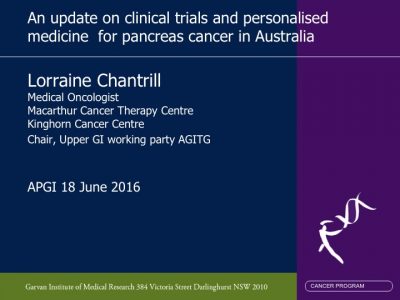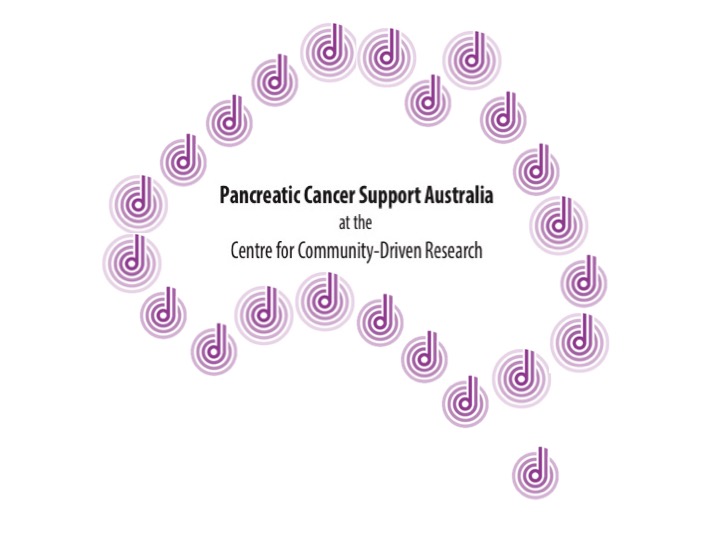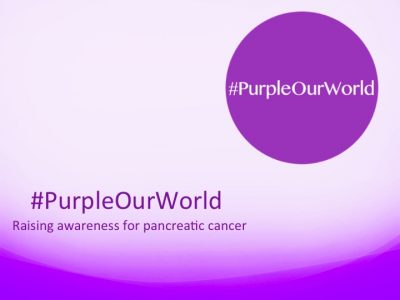.
.
.
.
On Saturday 18th June 2016, the APGI hosted their 6th Annual Clinical & Scientific Symposium at The Kinghorn Cancer Centre (TKCC). The event was well attended by the APGI community, which brings together pancreatic cancer patients, family members, carers, advocates, clinical colleagues and scientific collaborators. Some of the highlights from the day, including key presentations, have been outlined below.
Clinical & Community Session
The morning session was tailored to the general community to highlight the current state of play regarding clinical research studies, trials, advocacy and support groups. The turnout was impressive despite the rainy weather, with attendees traveling long distances and even interstate to participate. The group was warmly welcomed by the newly appointed APGI Chairmain Professor Anthony Gill, who introduced the following guest speakers:
Dr Alina Stoita, a gastroenterologist from St Vincent’s Hospital Sydney, provided an update on the high risk pancreatic cancer screening trial, which has been active for nearly 5 years. She explained associated risks for familial pancreatic cancer and inherited cancer syndromes and highlighted important lifestyle strategies for at-risk individuals to consider.
Dr Lorraine Chantrill, a TKCC medical oncologist, presented the current status of pancreatic cancer clinical trials in Australia and provided updates on the IMPaCT, POLO, Yosemite and HALO trials. Dr Chantrill also introduced a new smart phone application called ClinTrial Refer by Oncology NSW, which clinicians can use to identify active and relevant trials for their patients.
Dr Catherine Holliday, CEO for the Centre for Community-Driven Research (CCDR), spoke about a new pancreatic cancer support service called the Erica Ruck and Margaret Lees Nurse Network Program. This program provides a registered nurse to work closely with those newly diagnosed to develop a personalised care plan and help navigate available services.
Jessica Abelsohn, one of the founders of #Purple Our World, concluded the community session by sharing the touching and honest story of her mother Rochelle and explained how the family has turned this monumental loss into such a positive and inspiring initiative. She left no doubt that World Pancreatic Cancer Day on November 17th will be the biggest and purplest ever.
Scientific Session
The Scientific Session commenced after lunch, just as the sun came out. It was great to see so many colleagues and collaborators from around Australia in the room, as well as those community members keen to learn more. Key speakers were the co-Principle Investigators of the the ICGC project: Professor Andrew Biankin, fresh off the plane from Glasgow and Professor Sean Grimmond, who kindly took time out from his new appointment at the University of Melbourne. Both skilfully managed the mammoth task of summarising the APGI’s main achievements and findings over the last 6 years and illustrated what these findings mean for patients and researchers today.
Dr Paul Timpson, Lab Head of the Invasion and Metastasis group at the Garvan Institute, wrapped up the formal presentations by speaking about his recent achievements. Along with his team, Dr Timpson has created a ‘biosensor mouse’ that enables live imaging of pancreatic cancer cells as they start to ‘unzip’ from each other and metastasize. The fluorescence microscopy imaging videos demonstrating this process were captivating and the potential clinical applications of this technology is very exciting.
The 6th Annual Clinical and Scientific Symposium concluded with an open forum of questions and discussions, over some refreshments. Once again, the turnout and feedback was overwhelmingly positive and we look forward to providing another update on the APGI’s progress and achievements in 2017.




